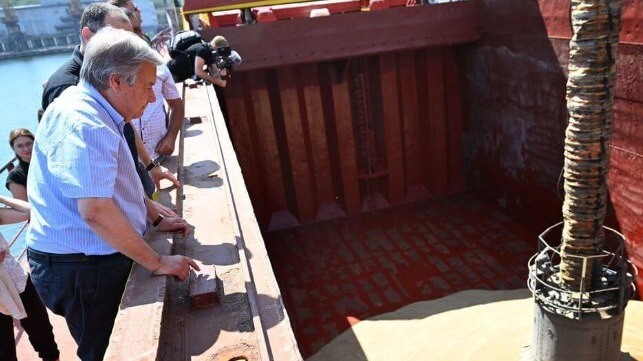With Black Sea Grain Deal and New Routes, Ukraine's Ag Exports Rebound

In about three weeks of operation, the amount of Ukrainian grain and agricultural products exported using the Black Sea shipping security corridor has reached more than 720,000 tonnes on 33 ships, the UN Joint Coordination Center in Istanbul announced Monday.
The renewed pace of maritime commerce is a major turnaround for Ukraine, which has been stuck with a backlog of more than 20 million tonnes of grain since the beginning of the Russian invasion in February. When combined with new rail, road and riverine corridors, the total rate of ag exports should reach four million tonnes a month in August, according to Ukraine's agriculture ministry.
While a major improvement, this is still lower than the normal rate of five to six million tonnes, and there are implementation issues on the sea route - for example, Russian warplane incursions, skittish shipowners, and wildly fluctuating freight rates, expert Pavlo Martyshev of the Kyiv School of Economics told DW.
Limitations notwithstanding, the extra exports are putting downward pressure on global commodity prices for wheat and other key foodstuffs, according to ag market analysts - providing relief for consumers in the developing economies most reliant on Ukraine's agricultural exports.
The security corridor agreement includes joint inspections in the Sea of Marmara, where Ukrainian, Russian and UN representatives check inbound and outbound vessels for weapons or other contraband. Combined ship inspections are now running at a swift rate of about ten vessels a day, enough to process the vessels nominated for the route.
The less-discussed aspect of the deal - getting more Russian fertilizer and food exports to market - remains a challenge, according to UN Secretary-General Antonio Guterres. Thpough Russia's agricultural sector is not sanctioned, many traders are still reluctant to buy Russian food products because of perceived risks. The UN is working with the U.S. and the EU on ways to reassure the market.
"The other part that is also important . . . relates to the unimpeded access to the global markets of Russian food and fertilizer, which are not subject to sanctions," said Guterres during a recent visit to Odesa. "Without [Russian] fertilizer in 2022, there may not be enough food in 2023."
